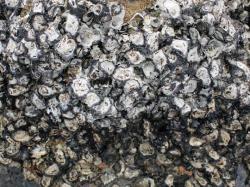Final CSX Oyster Express Train Delivered To Chesapeake Bay
January 2, 2015 | 4 min to read

WASHINGTON, D.C. — A unique, year-long partnership between the Maryland Department of Natural Resources (DNR), the National Fish and Wildlife Foundation (NFWF) and CSX recently came to a close with delivery of the 22nd and final freight train filled with fossilized oyster shells from Florida to the Chesapeake Bay.
Over the past 12 months, CSX has transported about 100,000 tons of the fossilized shell to help rebuild habitat in two Maryland oyster sanctuaries. Trains carrying the shells were delivered to CSX's Curtis Bay ore pier once every 10 to 14 days, where the shells were transferred to barges for the trip to the sanctuaries on Maryland's Eastern Shore. Once in place, the shells provide a habitat where young oysters can thrive.
Viable oyster reefs and the ecosystem they support provide natural filtering capabilities to help improve the water quality in the Chesapeake Bay, filtering silt, sediment and nitrates from the water.
"Using the best available science, DNR and our many partners are working together to restore oyster habitats in Maryland," said DNR Secretary Joe Gill. "We are already seeing remarkable results in Harris Creek. Once degraded reefs are now teeming with life as a direct result of our collaborative efforts, and we couldn't be more excited about the progress."
With the help of partners, the State has planted more than a billion oysters in the Harris Creek Sanctuary since 2011. Since restoration efforts began, areas with less than one oyster per square meter now have upwards of 25 oysters per square meter.
"The National Fish and Wildlife Foundation's partnership with CSX has provided an amazing opportunity to help accelerate oyster restoration in the Chesapeake Bay," said Jeff Trandahl, executive director and chief executive officer, NFWF. "Connecting CSX's transportation services with the great work of the State of Maryland and its partners, including the Oyster Recovery Partnership, is a great example of how public and private interests can work together to take a significant step toward a healthy Bay ecosystem."
"Oysters have been central to the Maryland way of life for centuries, and restoring the Chesapeake Bay's oyster beds is critical for this region's environment and the economy," said Michael Ward, president, chairman and chief executive officer of CSX. "CSX is proud to be a part of this unique public-private partnership in helping to restore one of our nation's greatest natural assets."
With a lack of natural, affordable shell available to support restoration of the two sanctuaries, DNR and its partners found the quality and quantity of the next best thing – fossilized shell – for purchase from Gulf Coast Aggregates near Carrabelle, Florida. To address the challenge and expense of moving the large volume of material, the National Fish and Wildlife Foundation negotiated an agreement with CSX to transport the shell at cost.
Maryland purchased the materials at a cost of approximately $6.3 million. CSX provided an in-kind investment valued at approximately $2.4 million in the form of reduced-cost transportation. The Maryland Environmental Service is coordinating the effort on behalf of the state. Production of young oysters and their placement on the new reefs will be conducted by the University of Maryland Center for Environmental Science and the Oyster Recovery Partnership.
The sanctuaries were chosen for the initial large-scale restoration project because of their water quality, salinity levels, shape, location, and protected sanctuary status all point to a high likelihood of success. More than 150,000 cubic yards of granite from a Maryland quarry also will be used as substrate in the sanctuaries. Scientists believe the project ultimately can serve as a blueprint to expand large-scale oyster restoration efforts to other Bay tributaries.
Maryland and its partners continue to make progress under all 10 points of the Governor's Oyster Restoration and Aquaculture Development Plan, adopted in 2010. In 2013, Governor O'Malley announced another oyster restoration landmark, as the state and its partners produced and planted 1.25 billion oysters that year. The University of Maryland Horn Point Hatchery was responsible for the record – the first time any oyster hatchery in the country has passed the 1-billion mark for Eastern oyster spat production.
About The Maryland Department of Natural Resources
The Maryland Department of Natural Resources is the state agency responsible for providing natural and living resource-related services to citizens and visitors. DNR manages nearly one-half million acres of public lands and 17,000 miles of waterways, along with Maryland's forests, fisheries and wildlife for maximum environmental, economic and quality of life benefits. A national leader in land conservation, DNR-managed parks and natural, historic and cultural resources attract 11 million visitors annually. DNR is the lead agency in Maryland's effort to restore the Chesapeake Bay, the state's number one environmental priority. www.dnr.maryland.gov
About NFWF
Chartered by Congress in 1984, the National Fish and Wildlife Foundation (NFWF) protects and restores the nation's fish, wildlife, plants and habitats. Working with federal, corporate and individual partners, NFWF has funded more than 4,000 organizations and committed more than $2.3 billion to conservation projects. Learn more at www.nfwf.org.
About CSX
CSX, based in Jacksonville, Fla., is a premier transportation company. It provides rail, intermodal and rail-to-truck transload services and solutions to customers across a broad array of markets, including energy, industrial, construction, agricultural, and consumer products. More information about CSX Corporation and its subsidiaries is available at www.csx.com. Like us on Facebook (http://www.facebook.com/OfficialCSX) and follow us on Twitter (http://twitter.com/CSX).
Source: Maryland Department of Natural Resources
